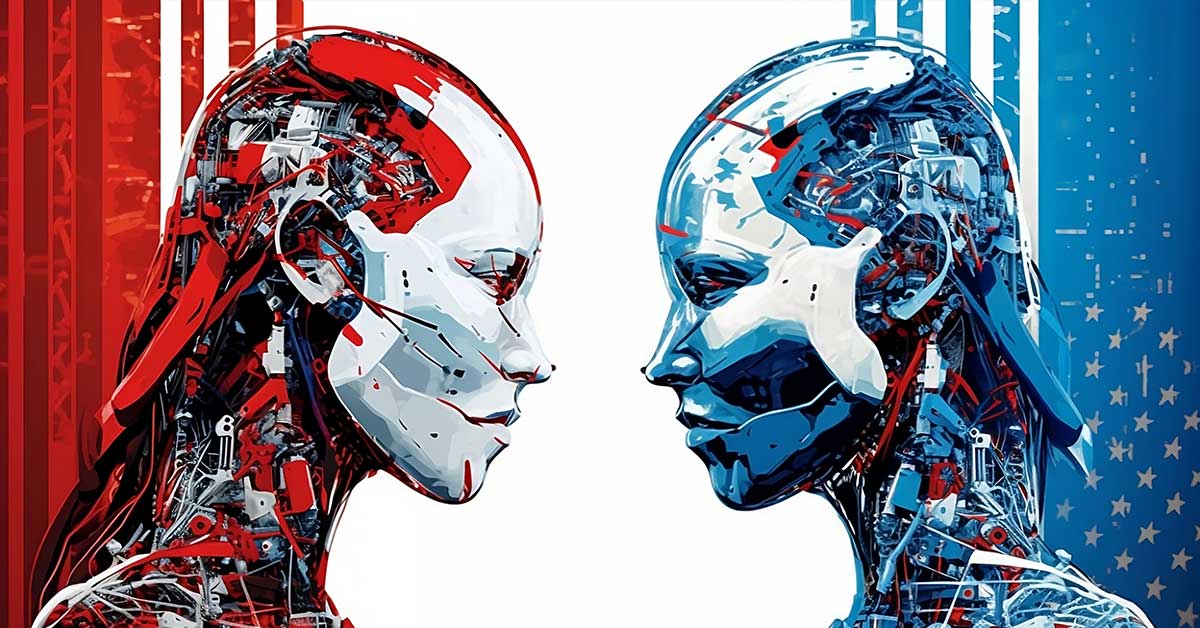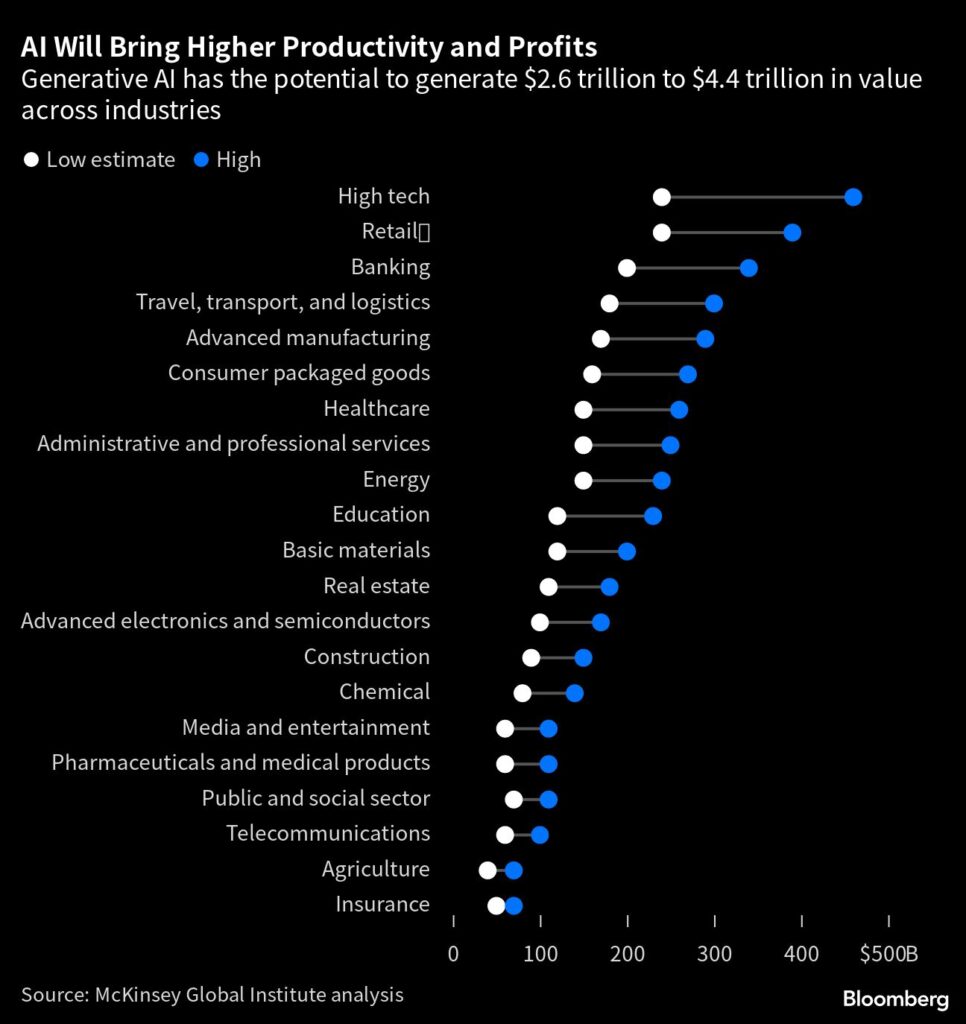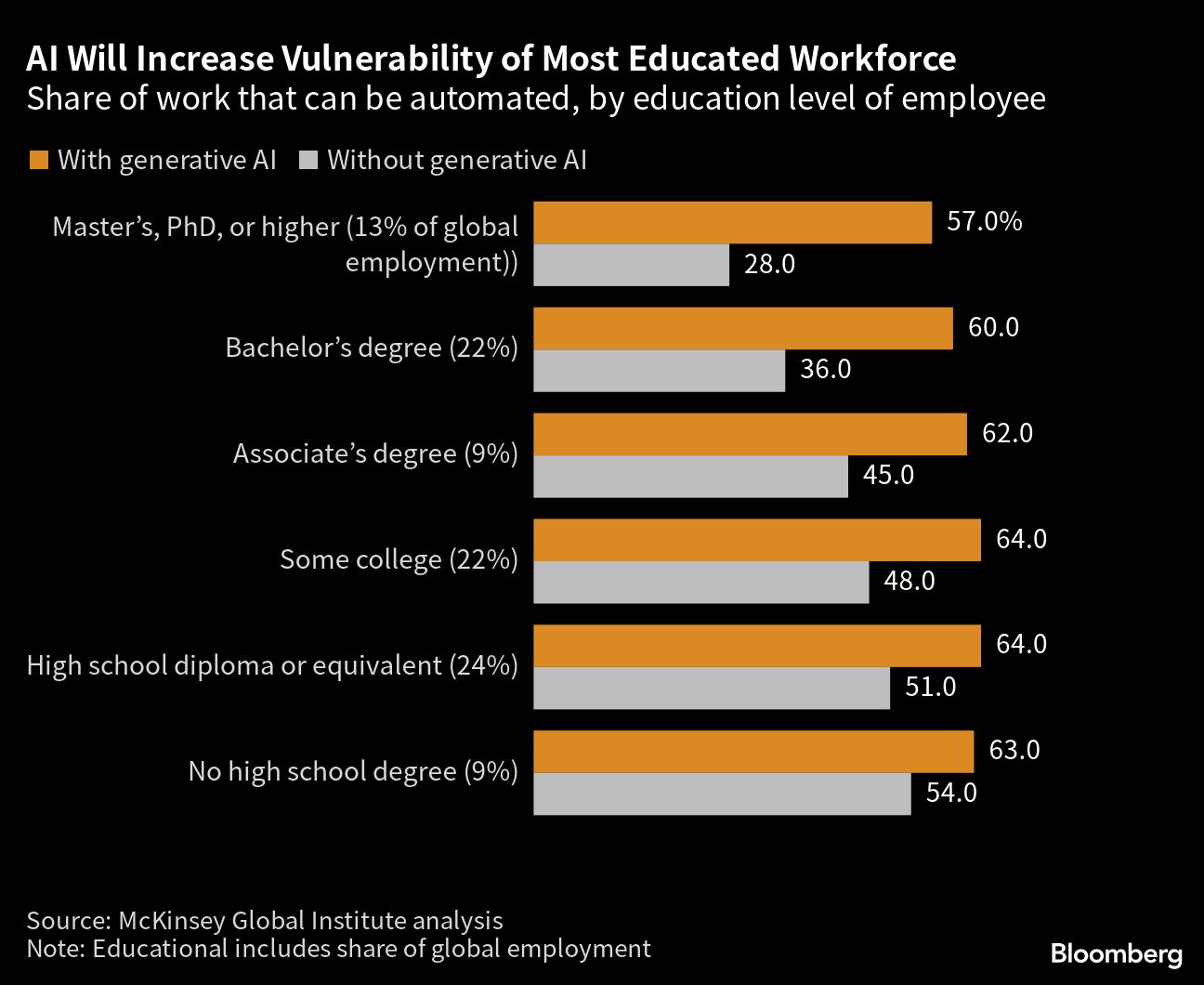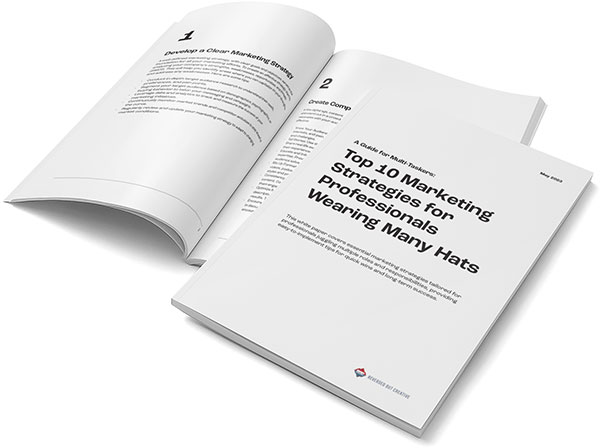
Table of Contents
What is AI Disruption?
Globalization and the rapid advancement of Artificial Intelligence (AI) have significantly transformed the modern workforce. As professionals with extensive experience in the agency and technology space, we recognize the profound impact of these revolutions on job markets. Today, we are seeing a new wave of challenges and opportunities with the rise of AI disruption, particularly with white-collar jobs this time.
The impact of AI-driven is having could be huge, with reports suggesting that by 2030, up to 800 million jobs globally could be at risk of being lost or seeing major shifts due to AI automation. This statistic, reported by reputable sources like McKinsey, highlights the urgency and importance of understanding and adapting to the disruptive forces of AI in the job market.
In our latest blog post, “Mastering AI Disruption: Navigating the Transformative Job Landscape,” we explore the parallels between job transformations caused by globalization and the potential impact of AI on today’s job market. By examining the historical effects of globalization, such as the displacement of millions of manufacturing jobs, we gain valuable insights into navigating the challenges posed by AI disruption.
Join us as we delve into the top industries impacted by AI, identify sectors that may be affected, and those that could remain resilient. Our aim is to provide actionable strategies for upskilling and adapting to the evolving job landscape. Building resilience and embracing new opportunities are vital in thriving amidst the transformative power of AI.
Together, let’s unlock the power of adaptation and continuous learning to shape a future where humans thrive alongside AI technologies.
(Note: The statistics mentioned in this introduction are based on research reports from reputable sources and can be found in the McKinsey Global Institute’s report on job displacement due to automation and the World Economic Forum’s Future of Jobs Report.)
Check out our summary video, visit our Youtube Channel and make sure to subscribe.
How Globalization Impacted Job Losses
The Manufacturing Sector: The Rise of Outsourcing
Globalization brought about a wave of outsourcing, with companies seeking cheaper labor costs overseas. This shift in production had a significant impact on manufacturing jobs, which were once the backbone of many economies. Developed countries experienced substantial job losses as factories closed and production moved to regions with lower labor costs. The International Labor Organization (ILO) reports that between 1991 and 2013, the share of global manufacturing employment in high-income countries declined from 25% to 15%, while it increased in low-income countries from 17% to 23%.
As manufacturing jobs dwindled, new opportunities arose in the digital realm. Industries like web development, graphic design, and app development witnessed increased demand as businesses adapted to the changing landscape. Professionals with the right skill sets found themselves at the forefront of this digital revolution, capitalizing on the growing need for web-based services and digital products.
Victims of Globalization: Navigating Economic Disruption
Workers in industries affected by globalization faced numerous challenges as their jobs disappeared. Traditional manufacturing hubs experienced unemployment, declining wages, and socioeconomic disparities. In an Economic Policy Institute (EPI) report, between 2001 and 2013, the United States lost 5.6 million manufacturing jobs, leading to significant economic dislocation in affected communities.
The victims of globalization had to adapt and seek opportunities in emerging industries to stay relevant in the job market. They recognized the need to upskill and reskill themselves to align with the changing demands of the globalized economy. Professions such as public relations, and copywriting became vital for businesses to tell their story as they adjusted their strategies to compete in the global marketplace. Workers who successfully navigated the challenges of globalization embraced the need for continuous learning and professional development.
The Need for Adaptation: Upskilling in a Changing World
Workers who recognized the need for adaptation during the era of globalization embraced upskilling and reskilling. They understood that acquiring new skills aligned with emerging industries was crucial to securing new job opportunities. As digitalization gained momentum, professions like [web design], [web hosting], and [media buying] emerged as sought-after skill sets.
Upskilling played a vital role in equipping individuals with the necessary tools to thrive in a changing world. The World Economic Forum has reported that 54% of all employees will require significant reskilling and upskilling by 2022. Workers who stayed ahead of the curve positioned themselves for the new job opportunities that arose, leveraging their newfound skills in the digital realm.
By recognizing the need for adaptation and investing in upskilling efforts, individuals were able to navigate the disruptive forces of globalization, demonstrating the importance of continuous learning and professional growth in a rapidly evolving job market.
The Rise of AI Disruption
The Efficiency and Cost-Effectiveness of AI Disruption: Enhancing Business Operations
Similar to the reasons behind outsourcing during globalization, AI presents businesses with the opportunity to enhance efficiency and cost-effectiveness. Automation powered by AI can perform tasks more efficiently and at a lower cost than human labor. Accenture is also reporting that AI has the potential to increase labor productivity by up to 40% by 2035.
AI disruption not only streamlines existing processes but also creates new roles in AI ethics, machine learning, data analysis, and related fields. For instance, LinkedIn postings mentioning “GPT” grew by 51% from 2021 to 2022, showcasing the growing interest in AI-driven tools that produce written content on command. Similarly, Indeed witnessed a more than 140% surge in mentions of “language model” in job postings from February 2020 to the present.

Marketing and Advertising Job Disruption: Transforming the Industry
The marketing and advertising industry is experiencing profound disruption from AI technologies. AI-powered algorithms and tools are revolutionizing processes such as SEO optimization, data analysis, and WordPress web development. Automation and machine learning algorithms enable marketers to leverage vast amounts of data to gain insights and create targeted, personalized campaigns. Salesforce says a recent survey they conducted found that 51% of marketers are already using AI, and another 27% are planning to incorporate it into their marketing strategies.
While certain tasks within the marketing and advertising field are becoming automated, AI disruption also brings forth new opportunities for professionals who can effectively leverage AI technologies. These individuals can deliver creative and data-driven solutions, utilizing AI to optimize customer targeting, personalize messaging, and enhance campaign performance.
Embracing Automation: Jobs Going Away and New Opportunities Arising
AI’s potential to eliminate human error, increase efficiency, and enhance productivity makes it an attractive solution for various industries. As AI automation replaces certain jobs, it is important to recognize that new opportunities also arise. Professionals who embrace upskilling in AI-related fields position themselves for success in the evolving job market.
Industries such as graphic design, app development, and digital marketing services provide avenues for professionals to thrive in the AI-driven era. For instance, graphic designers can collaborate with AI-powered tools to enhance their creative process and deliver visually stunning designs. App developers can leverage AI to create intelligent applications that offer personalized user experiences. In the realm of digital marketing, professionals who combine their domain expertise with AI technologies can drive impactful campaigns, optimize conversion rates, and achieve targeted customer engagement.
By embracing automation and upskilling in AI-related fields, professionals can stay ahead of the curve, leveraging the transformative power of AI to navigate the changing job landscape and unlock new opportunities for growth and success.
Comparing Globalization and AI Disruption
The Speed of Disruption: AI’s Rapid Impact
One key distinction between globalization and AI disruption is the speed of transformation. While globalization unfolded gradually over several decades, AI disruption is occurring at an accelerated pace. The World Economic Forum predicts that by 2025, automation and AI technologies will have a disruptive impact on the workforce, resulting in the displacement of 85 million jobs worldwide.
Jobs that were once considered secure are now at risk due to AI automation. The McKinsey Global Institute estimates that approximately 800 million jobs could be automated by 2030. Workers need to be proactive in adapting their skills and embracing new roles to keep pace with AI’s rapid advancement. In a PwC report, up to 30% of jobs in the United Kingdom are at high risk of automation within the next 15 years.

Upskilling: A Key to Success in the Face of AI Disruption
Just as workers affected by globalization had to upskill to adapt to the post-industrial economy, today’s professionals need to acquire new skills to work alongside AI technologies. Upskilling is a critical strategy to ensure employability and career resilience in the face of AI disruption. Industries that are less susceptible to automation, such as [public relations], [copywriting], and [media buying], require a blend of human expertise and AI assistance.
The World Economic Forum’s Future of Jobs Report highlights the importance of upskilling, with 94% of business leaders believing that employees must learn new skills throughout their working lives. Companies like Amazon have embraced upskilling programs to equip their workforce with the necessary skills to collaborate effectively with AI technologies.
Learning from the Past: Avoiding the Pitfalls of Globalization
The victims of globalization provide valuable lessons for navigating AI disruption. By recognizing the importance of upskilling and embracing new opportunities early on, workers can proactively shape their future. Governments and businesses should collaborate to create supportive policies, regulations, and initiatives that protect jobs and ensure a smooth transition into the AI-enabled era.
Germany’s Industry 4.0 initiative serves as an example of proactive policies aimed at supporting workers through digital transformation. The initiative focuses on upskilling and reskilling programs, fostering a culture of lifelong learning, and promoting the responsible integration of AI technologies in industries.
Learning from the lessons of globalization, it is crucial to prioritize a human-centric approach to AI adoption. By investing in training and education programs, individuals can acquire the skills needed to work collaboratively with AI technologies, minimizing the risk of job displacement and fostering a future where humans and AI can coexist harmoniously.
Navigating the Future: Adapting to AI Disruption
The Importance of Lifelong Learning and Upskilling
As AI continues to reshape the job market, the importance of lifelong learning and upskilling becomes paramount. Professionals must embrace a growth mindset and actively seek opportunities to acquire new skills. The World Economic Forum says that by 2025, over 50% of all employees will require significant reskilling and upskilling to remain relevant in their current roles.
Online courses, certifications, and workshops offer accessible avenues for acquiring expertise in emerging fields like AI ethics, machine learning, and data analysis. Platforms like Coursera, Udemy, and LinkedIn Learning provide a wide range of courses to help individuals stay ahead of the curve. By investing in continuous learning, individuals can remain agile and relevant in the face of AI disruption, enhancing their employability and career prospects.
Government Regulations and Social Considerations
To mitigate the impact of AI job disruption, governments have a crucial role to play in implementing regulations and policies that prioritize job protection and reskilling initiatives. They can work in collaboration with businesses, educational institutions, and industry experts to develop comprehensive frameworks that address the challenges posed by AI disruption.
Social considerations must also be taken into account. Businesses face increasing pressure from consumers, employees, and society as a whole to maintain human employment and promote responsible AI practices. Ethical considerations, such as transparency, fairness, and accountability in AI decision-making, should be integrated into the development and deployment of AI technologies.
By striking a balance between technological advancement and ethical employment practices, societies can foster a future where AI coexists with a thriving human workforce. Collaborative efforts between governments, businesses, and communities are essential to creating supportive environments that promote job security, skill development, and inclusive growth.
Building Resilience: Embracing New Roles and Industries
Building resilience in the face of AI disruption involves embracing new roles and industries that align with the evolving job market. Professionals can explore opportunities in fields such as [web design], [web development], [app development], and [public relations]. These industries require a blend of technical expertise and human creativity, making them less susceptible to full automation.
Embracing these new roles and industries requires a proactive approach to upskilling and adapting to changing job requirements. Individuals can seek specialized training programs, join professional communities, and participate in industry conferences to stay updated with the latest trends and technologies.
Furthermore, fostering interdisciplinary skills and a diverse skill set can enhance resilience in the face of AI disruption. The ability to collaborate across domains and leverage both technical and non-technical expertise becomes increasingly valuable. By adapting and expanding their skill sets, individuals can position themselves for success in the AI-driven future, leveraging AI technologies as tools rather than viewing them as threats to job security.
As we navigate the transformative era of AI disruption, it is crucial for individuals, businesses, and governments to embrace continuous learning, prioritize ethical considerations, and foster a supportive environment that empowers individuals to adapt, innovate, and thrive in the evolving job landscape. Together, we can shape a future where AI augments human capabilities, unlocking new possibilities for productivity, creativity, and economic growth.
Conclusion
The job revolution sparked by globalization and AI disruption presents both challenges and opportunities for workers worldwide. By drawing parallels between the victims of globalization and the potential impact of AI, we can learn valuable lessons about the importance of upskilling and adapting to changing job markets.
Firstly, it is crucial for individuals to recognize the significance of lifelong learning and acquiring new skills. Embracing a growth mindset and actively seeking opportunities for continuous education and upskilling will enable professionals to remain agile and competitive in the evolving job landscape. Online courses, certifications, and workshops provide accessible avenues for acquiring expertise in emerging fields such as AI ethics, machine learning, and data analysis.
Secondly, governments and businesses have a pivotal role in mitigating the impact of AI job disruption. Implementing regulations and policies that prioritize job protection and reskilling initiatives is essential. Collaboration between government bodies, educational institutions, and industry experts can foster supportive environments that facilitate the transition into the AI-enabled era. Ethical considerations, transparency, and fairness should also be integrated into AI development and deployment to ensure responsible AI adoption.
Lastly, individuals should embrace new roles and industries that align with the evolving job market. Fields such as [web design], [web development], [app development], and [public relations] offer opportunities that require a blend of technical expertise and human creativity. Professionals who adapt and expand their skill sets can position themselves for success in the AI-driven future, leveraging AI technologies as tools rather than viewing them as threats to job security.
Let us navigate this transformative era together, building a future that leverages the power of AI while preserving the dignity and resilience of the human workforce. By embracing continuous learning, prioritizing ethical considerations, and fostering collaborative efforts, we can unlock the full potential of AI and create a harmonious coexistence between humans and technology. Together, we can shape a future where individuals thrive, businesses innovate, and societies flourish in the age of AI disruption.
Key Takeaways
- Upskilling is crucial to navigating job revolutions like globalization and AI disruption.
- Governments should implement regulations and policies that prioritize job protection and reskilling initiatives.
- Social considerations and responsible AI practices must be prioritized by businesses.
- Embracing new roles in industries such as graphic design, SEO, and copywriting, can provide opportunities in the AI-driven future.
- Lifelong learning and continuous growth are essential for professionals to thrive in a rapidly evolving job market.
FAQ’s
While AI automation may replace certain jobs, it is important to recognize that it also creates new roles and opportunities. Rather than viewing AI as a threat to human employment, it is crucial to adapt and upskill to remain relevant in the changing landscape. By embracing lifelong learning and acquiring new skills, individuals can position themselves for the emerging job opportunities that AI disruption brings.
Workers can protect themselves by proactively embracing upskilling and acquiring new skills aligned with AI-related fields. It is essential to identify industries that require a combination of human expertise and AI assistance. By exploring and transitioning into these fields, individuals can leverage their unique capabilities alongside AI technologies. Additionally, staying adaptable and flexible in one’s skill set allows for easier transition into new roles as automation occurs.
The victims of globalization highlight the importance of adapting to changing job markets and acquiring new skills to thrive in the post-industrial economy. Resilience and upskilling are crucial for navigating job revolutions. By learning from the experiences of those affected by globalization, individuals can better understand the significance of being proactive in upskilling and seeking opportunities in emerging industries. The ability to recognize shifts in the job market and adapt accordingly is key to maintaining long-term employability.
Businesses play a vital role in promoting responsible AI adoption while protecting jobs. One way is by prioritizing ethical employment practices, which involves ensuring that AI technologies are implemented in ways that enhance human capabilities rather than replace them entirely. Investing in employee upskilling programs and providing opportunities for reskilling and retraining can also help protect jobs. Collaboration with governments and organizations is crucial to create supportive policies, regulations, and initiatives that prioritize job protection and facilitate a smooth transition into the AI-enabled era.
Industries that require a blend of human creativity, critical thinking, and technical expertise are generally less susceptible to full automation. Some examples include [public relations], [graphic design], and [media buying]. These industries rely on human skills such as communication, problem-solving, and strategic thinking, which are not easily replicable by AI. By focusing on industries that leverage these uniquely human capabilities alongside AI technologies, individuals can position themselves in roles that are more resilient to automation, increasing their long-term employability.
Contact Us
At Reversed Out Creative, we understand the challenges and opportunities presented by AI disruption. Our team of experts specializes in web design, SEO, graphic design, and digital marketing services. Reach out to us through our contact form to learn more about navigating the evolving job market and embracing the potential of AI. Together, let’s shape a future that combines human ingenuity with the power of AI.
Next Article: 7 Powerful SEO Services that Can Skyrocket Your Website’s Google Ranking
©2024 Reversed Out LLC. All rights reserved. Privacy Policy.


